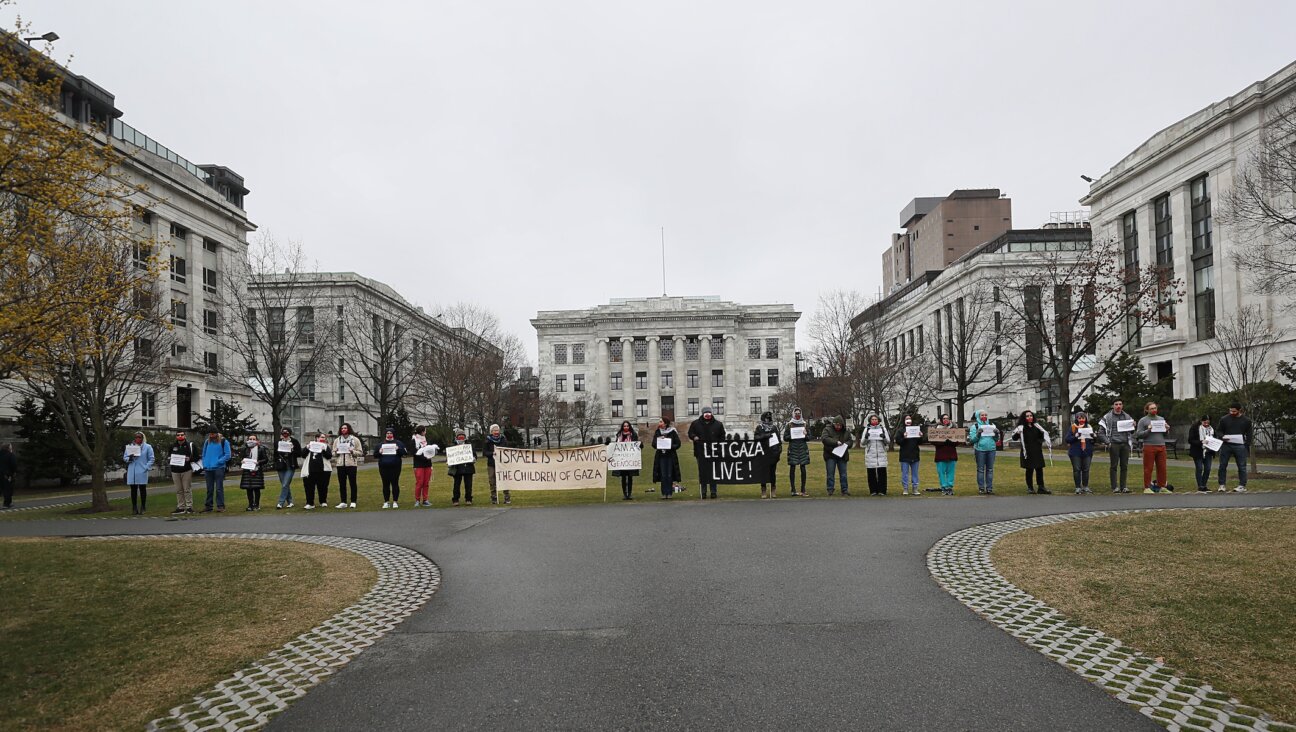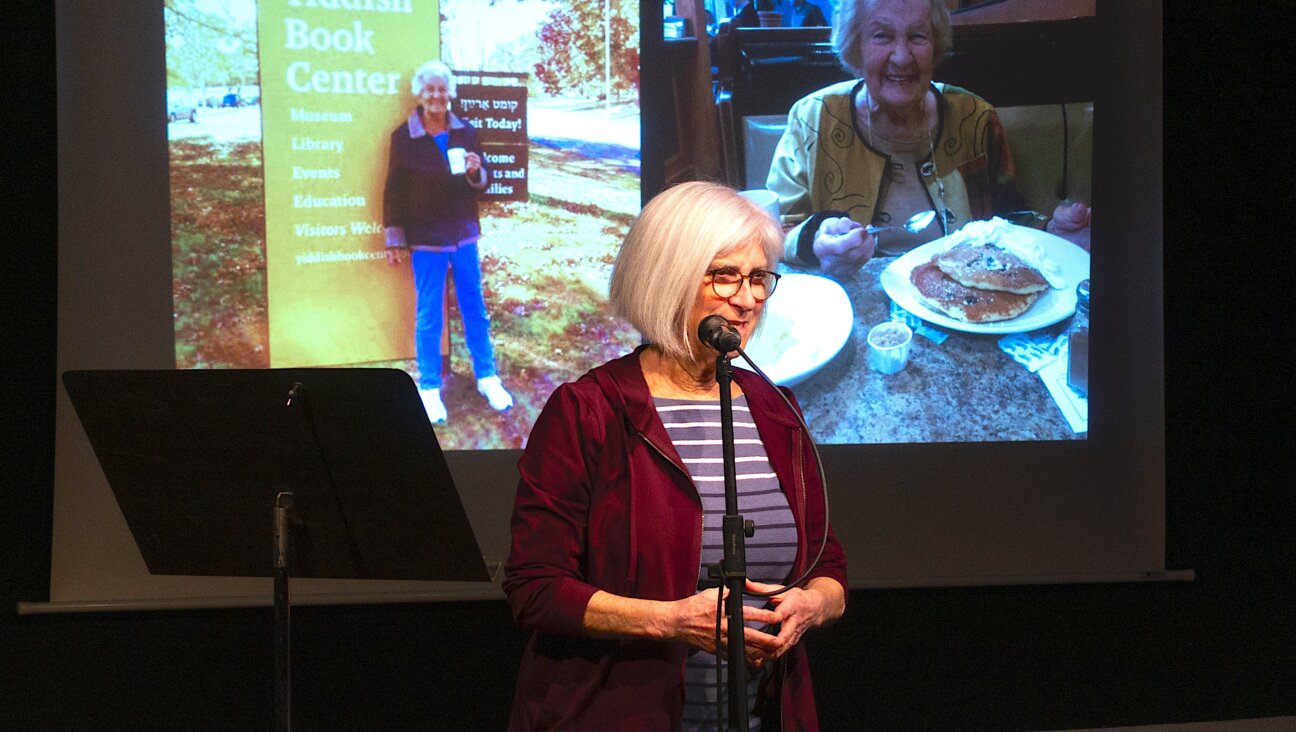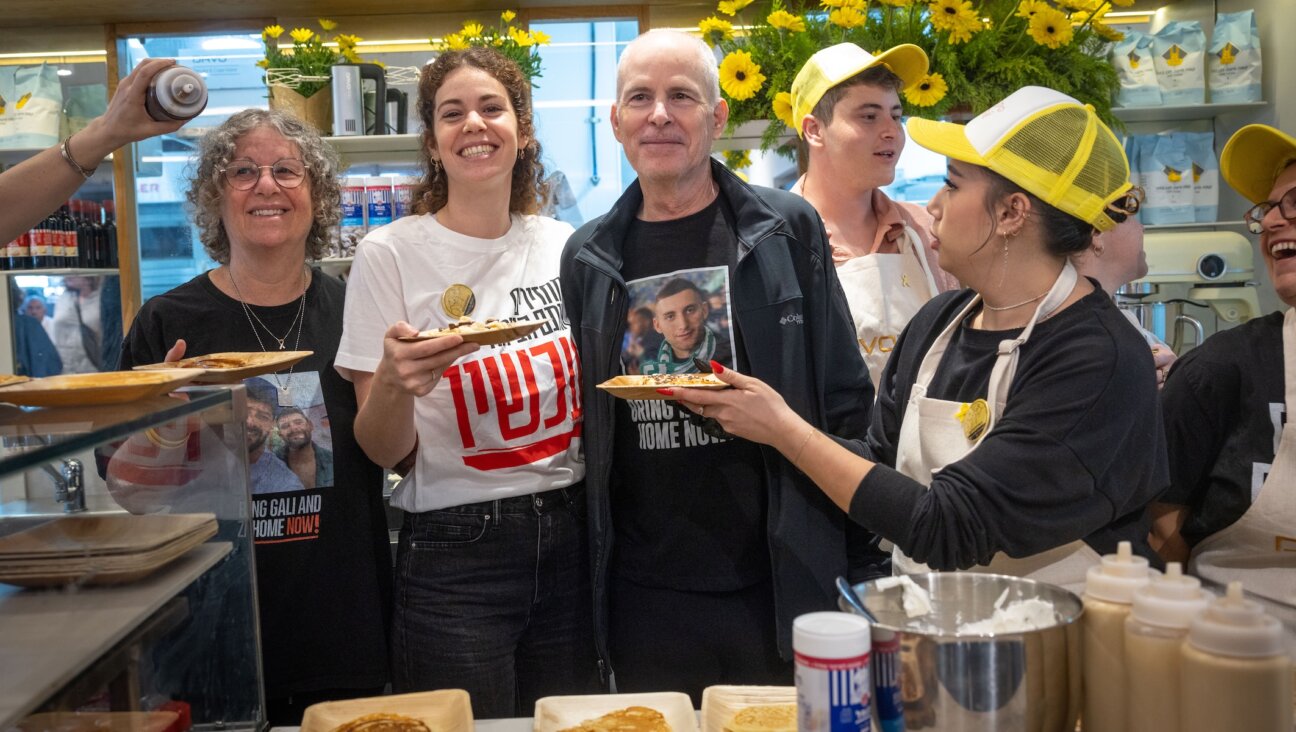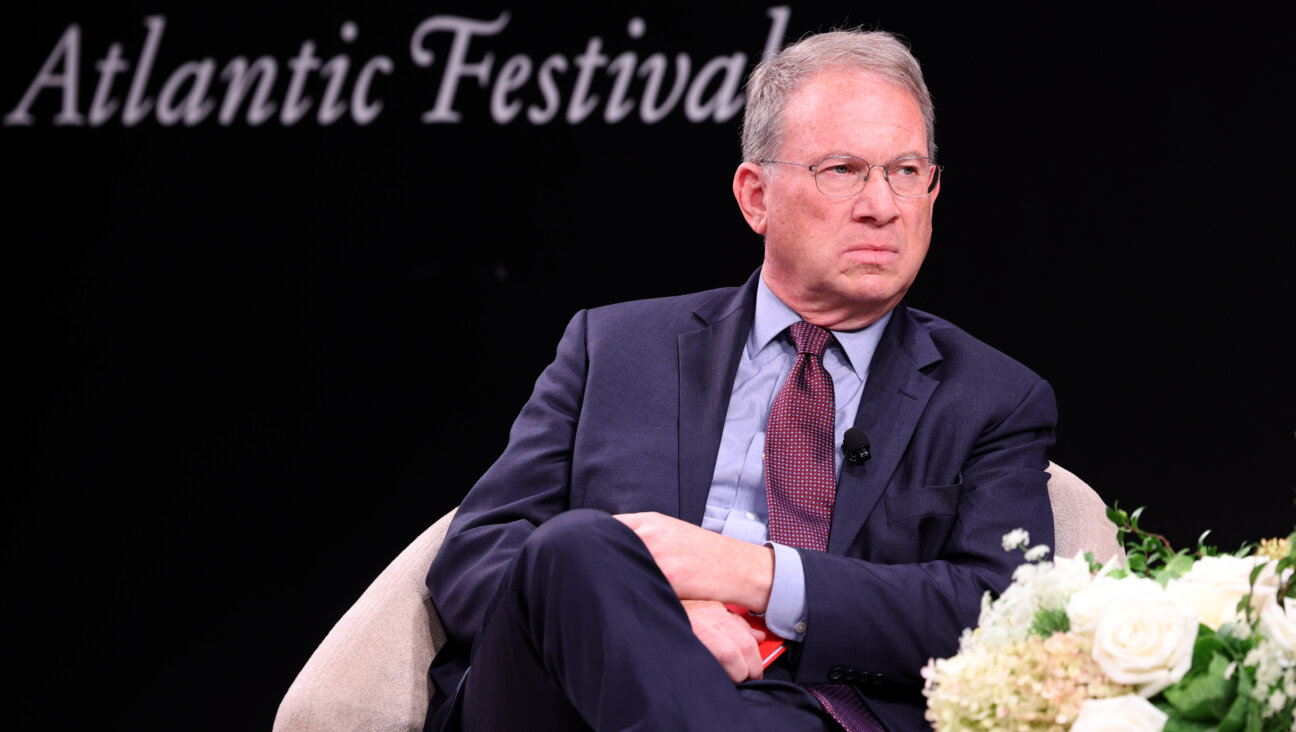‘Third Temple’ Booster Snags Boldface Names For Savannah Parley
Along with sweet accents and sweeter food, this city is known for its graceful sweep of Spanish moss dangling from thick, gnarled trees old enough to have heard every story there is to tell.
This, however, may be a new one: An Israeli businesswoman living in nearby Bluffton, S.C., dreams of rebuilding the Third Temple in Jerusalem and causes a local stir by bringing a collection of Israeli officials to town for a conference on the future of the Jewish state.
The businesswoman, Orly Benny Davis, organized a three-day conference at the Savannah International Trade & Convention Center this week, which attracted two local Republican congressmen; leading center and right-wing American Jewish commentators, and current and former Israeli officials, including senior Likudniks and other hawks.
Though the lineup boasted many speakers opposed to making concessions to the Palestinians, it included the Atlanta-based Consulate General of Israel to the Southeast of the United States, the Savannah Jewish Federation and the local chapter of Hadassah as co-sponsors, in addition to several groups associated with rightist positions on Israel, including the Zionist Organization of America, Christians’ Israel Public Action Committee and American Friends of Likud.
At least one prominent Jewish local, Savannah’s Reform rabbi, Arnold Mark Belzer, did not attend or promote the event, titled “Convergence: Claims and Challenges of Israel’s Future in the Middle East,” saying he objected to Benny Davis’s politics. And two national leaders of the liberal group Brit Tzedek v’Shalom co-authored an op-ed in the Savannah Morning News rejecting Benny Davis’s “personal agenda, regardless of the merits of the conference sessions.”
At issue was the lead role that Benny Davis played last year in organizing a meeting that brought 1,200 people to Jerusalem to support Jewish sovereignty over the city and the dream of building the Third Temple — a project that critics say would require destroying the mosques situated on the Temple Mount. Benny Davis disagrees — the Temple Mount, she told the Forward, covers 44 acres, enough space to construct the Third Temple without harming the mosques. To boot, she kicked off the conference with the wish that “the dove of peace will fly again.”
At the start of the conference, Moises Paz, executive director of the Savannah Jewish Federation, approached the Forward to engage in what he acknowledged to be a form of damage control.
“The agenda for the conference was not the Temple Mount,” he said, calling the issue irrelevant and divisive. Of course, at the same time, the conference touched on plenty of issues that could be considered divisive.
“The federation is proud to support all responsible views and opinions regarding Israel, and we had a marvelous opportunity to bring in some internationally renowned speakers, policy-makers and thinkers on the Middle East,” Paz said. “We thought that the ability to bring in these outstanding personalities outweighed any downside” and enabled citizens of Savannah “to meet firsthand some of the people that you would only read about.”
Drawing on what she described as personal connections and friendships, Benny Davis said she selected the speakers based on their smarts, not on their party or affiliation. According to Benny Davis, all the Israeli notables spoke free of charge, including Ra’anan Gissin, former prime minister Ariel Sharon’s media adviser who served in the same capacity for Prime Minister Ehud Olmert; Likud lawmaker Yuval Steinitz, former chairman of the Knesset Foreign Affairs and Defense Committee; Moshe Ya’alon, the former chief of staff of the Israeli military, and Giora Eiland, national security adviser to Sharon. Also attending was Ambassador Reda Mansour, a Druze who serves as Israel’s Consul General to the Southeast; Morton Klein, national president of the Zionist Organization of America, and several Christian Zionists. Middle East analyst Daniel Pipes was scheduled to attend, but he took ill.
Much of the formal discussion centered on the usual fare among meetings of Jews grappling with Israel’s security: the nuclear threat from Iran, parallels between Israel’s and America’s wars against terrorism, and the struggle to improve Israel’s image in the media. A prominent theme was the notion that all concessions to the Palestinians should be halted — an idea at odds with governments in Jerusalem and Washington that still envision eventual Israeli withdrawals from the West Bank in pursuit of a two-state solution.
“We are going to have an endless war if we want to exist,” said Arieh Eldad, plastic surgeon and National Union Knesset member. Eldad called the internationally sponsored road map peace plan a “road map for Israel’s extermination.”
“The issue is the very existence of the State of Israel,” he said.
“It’s not very easy to accept, but I tell you as a physician — it’s the first step to fight the cancer,” he added, referring to the need to halt concessions. “Land for peace is the wrong medication for a misdiagnosed disease.”
Ya’alon made a similar point in his keynote address Sunday night.
“Israel shouldn’t initiate any unilateral withdrawal,” since concessions only encourage the “jihad against the West,” he said, calling the two-state solution an unclear model. “We should look for a new paradigm to allow the Palestinian people a better life and the Israeli people a more secure life.”
Asked to outline the new paradigm, Ya’alon said he didn’t have one.
Much of these remarks were greeted with quiet nods of approval. In part that’s because the audience was so small — fewer than 200 people, with fewer than 70 attending most panels.
But according to Benny Davis, they were the right people — the influential ones.
The event was billed as being “directed to members of the Jewish communities of Savannah and South Carolina’s low country, as well as others interested in the current status of Israel’s relationship with its neighbors and the United States.”
Such a high-level Israeli contingency seemed like a slightly curious development for these parts. And not just because Savannah, where even the pungent smell of paper mills has its charm, is the type of place where one goes to get away from it all. After all, the G8 recently held its summit in Savannah. But this is a small Jewish community, if an old and storied one.
Although a Jewish food festival in one of the city’s landmark squares is slated for this weekend, the community numbers just 4,000. In fact, Savannah’s Jewish federation has launched a campaign urging Jews to move here to secure the city’s Jewish future.
With feeble attendance, the convergence conference felt less town hall, more Camp David.
Still, those who made the trip felt it was well worth it.
For one thing, it made news. But it was also a networking opportunity.
Gissin said that he used the opportunity to “create a coalition of interests” and an “alliance of potential victims” among Israel and people and nations of similar values against the threat of terrorism. Klein gushed with relief over finding support for opinions he has long voiced — that concessions beget war. As these theories have borne out, he says, he has found increasing acceptance.
“I can really say anything now. Nobody’s mad anymore” about ZOA’s opposition to Israeli pullouts, Klein said.
“What am I extremist about?” he asked, with a laugh. “I don’t trust the Arabs?”
The Forward is free to read, but it isn’t free to produce

I hope you appreciated this article. Before you go, I’d like to ask you to please support the Forward.
At a time when other newsrooms are closing or cutting back, the Forward has removed its paywall and invested additional resources to report on the ground from Israel and around the U.S. on the impact of the war, rising antisemitism and polarized discourse.
Readers like you make it all possible. We’ve started our Passover Fundraising Drive, and we need 1,800 readers like you to step up to support the Forward by April 21. Members of the Forward board are even matching the first 1,000 gifts, up to $70,000.
This is a great time to support independent Jewish journalism, because every dollar goes twice as far.
— Rachel Fishman Feddersen, Publisher and CEO
2X match on all Passover gifts!
Most Popular
- 1

Film & TV What Gal Gadot has said about the Israeli-Palestinian conflict
- 2

News A Jewish Republican and Muslim Democrat are suddenly in a tight race for a special seat in Congress
- 3

Fast Forward The NCAA men’s Final Four has 3 Jewish coaches
- 4

Culture How two Jewish names — Kohen and Mira — are dividing red and blue states
In Case You Missed It
-

Fast Forward Trump administration to review nearly $9 billion in Harvard funding over campus antisemitism
-

Yiddish World Yiddish fans in Berlin launch a Yiddish open mic series
-

Fast Forward Cornell pro-Palestinian student leader opts to leave US, as Columbia ‘self-deportee’ makes her case to return
-

Fast Forward ‘Need a final solution’: Podcast host calls for mass deportation of U.S. Jews
-
Shop the Forward Store
100% of profits support our journalism
Republish This Story
Please read before republishing
We’re happy to make this story available to republish for free, unless it originated with JTA, Haaretz or another publication (as indicated on the article) and as long as you follow our guidelines.
You must comply with the following:
- Credit the Forward
- Retain our pixel
- Preserve our canonical link in Google search
- Add a noindex tag in Google search
See our full guidelines for more information, and this guide for detail about canonical URLs.
To republish, copy the HTML by clicking on the yellow button to the right; it includes our tracking pixel, all paragraph styles and hyperlinks, the author byline and credit to the Forward. It does not include images; to avoid copyright violations, you must add them manually, following our guidelines. Please email us at [email protected], subject line “republish,” with any questions or to let us know what stories you’re picking up.














